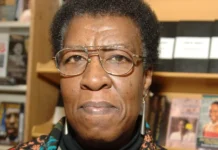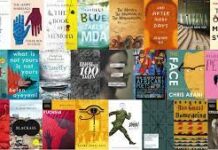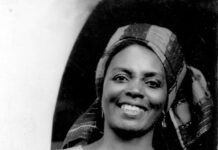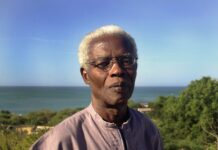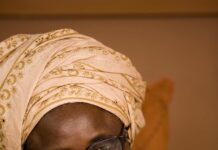B. Kojo Laing (‘B’ for Bernard) was a novelist and poet, whose writing is characterized by its hybridity, using Pidgin and vernacular alongside standard English. Laing is the author of the novels Search Sweet Country (1986), Women of the Aeroplanes (1988), Major Gentl and the Achimota Wars (1992), Big Bishop Roko and the Altar Gangsters (2006) and the poetry collection Godhorse (1989). His poetry addresses the themes of identity and alienation while his novels combine magical realism with political commentary. Some readers have described his debut – Search Sweet Country as reading a dream with intense vivid imagery and humanization of inanimate objects. Laing’s work is an absorbing experience (1946 – 2017).





Is He African Literature’s Greatest Linguistic Innovator? | The 5 Books of the Late Kojo Laing
May 10, 2017
A truly great linguistic innovator, Kojo Laing has been hailed by Binyavanga Wainaina as “Africa’s best novelist, by far.” His prose, notes Uzodinma Iweala, “can only be described as heated, bubbling over with images, slamming metaphor and simile against quiet and simple observation, sometimes purposefully confusing meanings in the most poetic fashion.” Described as “specifically Ghanaian in source” and praised for its originality, his writing combines Ghanaian Pidgin and indigenous languages with standard English and relies on wordplay for extended effect. “When it comes to sheer physicality of language,” The Los Angeles Times once concluded, “Laing’s in a class of his own.”
Laing first entered the literary scene in the 1970s as a poet “drawing on surrealism” and was awarded Ghana’s National Poetry Prize Valco Award in 1976. But it was the 1986 publication of his first novel, Search Sweet Country, that garnered him wide attention. He went on to produce three more novels—Woman of the Aeroplanes (1988), Bishop Roko and the Altar Gangsters (1992), and Major Gentl and Achimota Wars (2006)—and one collection of poetry, Godhorse (1989).
These works mix fantasy and mythology, and when Laing wasn’t tinkering with content, he was doing so with form. His linguistic hybridity threw words on the floor, beat them to pulp, picked them up, and used them, so many of them, in so many ways. In his latter novels in which he ventures into futurism, Laing has been read, in academia, as having indigenized “jujutech—a hybrid of science fiction and African folk traditions.”
We bring you the five books of a man who has impacted the stylistics of a continent’s literature, who remains a palpable influence on the generation that came after him, and whose talents “were defying expectations, genre, and even time itself.”
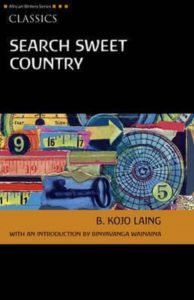 1. Search Sweet Country (1986)
1. Search Sweet Country (1986)
When it was first published by Heinemann in 1986, Laing’s masterpiece was difficult to categorize—it resisted being termed magical realism, resisted being termed satire. Its plot is thin and sketches some occurrences that follow a failed horse-smuggling effort at the international airport in Accra. Its characters are many, their stories told in a non-chronological manner. Its environment and emotional tone fueled by the narrative confusion. But the praise was unanimous.
Foreign Affairs declared that it “breaks new ground for the genre.” The New York Times Book Review described it as “surreal and satirical; every sentence is relentlessly figurative,” observing that Laing “has found an original voice that is all the stronger for making few concessions to the Western reader: wild, sophisticated, sorrowful.” The Pittsburgh Post-Gazette called it “a barrage of lilting prose racing through and past expressive characters” whose “most rewarding reading comes from surrendering into that current, basking in the crisp descriptions and lively language,” stating how it is a “dense and perceptive homage to the vibrant and unsteady metropolis, brilliantly shaped by…lyrical prose and complete awareness of his characters.” Publishers Weekly was impressed at how the book’s “abrupt shifts in tone create an atmosphere of simultaneity, gathering contradictions,” as well as its “insisting on the multivalence of humanity.”
The novel won Ghana’s Valco Award, the Ghana Book Award, and the Ghana Association of Writers’ National Novel Prize.
It was reissued by McSweeney’s Publishing in 2011 with a much-cited Introduction by Binyavanga Wainaina in which he asserts that it is “the finest novel written in English ever to come out of the African continent.”
In a review inSlate, Uzodinma Iweala notes: “There is no issue in this book, no issue in the Ghana of the time period Search Sweet Country chronicles that is not pulled into Laing’s vortex of language about the search for an authentic identity. Religion, sex, politics, gender roles, even love are all caught in Laing’s lyrical constructions and turned about for us to examine, appreciate, and also at times loathe.” Comparing Laing’s fictional world to those of Ben Okri and Mia Couto, he muses: “Reading Search Sweet Country is like reading a dream. Each page delivers an intense blast of vivid imagery, a world in which landscapes come to life when inanimate objects receive human characterizations.”
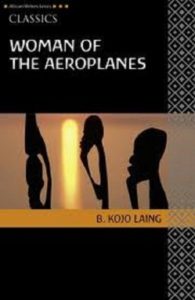
2. Woman of the Aeroplanes (1988)
Coming two years after Search Sweet Country, Laing’s sophomore effort built on the unique position he was carving out for himself among writers of his generation. Set in Tukwan, Ghana—“a town of goats, elephants, ducks, lakes and lawyers”—and Levansvale, Scotland, it follows immortal inhabitants who aim to “invent in order to survive, despite the paradox that inventions will condemn them to greater immortality.” The novel employs the humor and satire of Ghanaian folktales with metaphorical imagery and exoticism. Kirkus Reviews underlines it as “stunningly original and often stylistically brilliant…in a bewildering profusion of characters, ideas, and events.”
Commenting on the “jungle of the prose”—“strong, original stuff, foreign and unexpected”—The Los Angeles Times likens Laing’s writing to “the first bite of raw garlic.” Laing “creates a world where languages—English, the local dialects of Ga and Mfantse—try to meet. Often he brings it off and they dance.” Reed Business Information notes: “Characterization and language are both inventive, consistent, and supportive of action from the opening sentence to the end. This is no sleepy Brigadoon. Here, activity and travel are constant, moving in and out of histories; romance flourishes; and love makes daily inventions possible.”
The book won Ghana’s Valco Award in 1993. It was reissued in 2011 with an Introduction by Ellah Allfrey.
3. Godhorse (1989)
Fresh from the new fame from his first two novels, Laing turned up this 64-page collection dealing with nature, love, death, politics and everyday life. It was published by Heinemann African Writers Series in 1989. Arguably the least discussed of his works, there is relatively little information about the collection online.
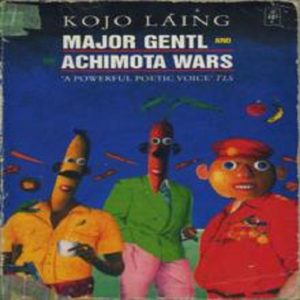
4. Major Gentl and Achimota Wars (1992)
With his third novel and fourth book, Kojo Laing went futuristic, sci-fi and ecological. Beginning in the year 2020, a year in which Africa has been reborn, this surrealistic tale focuses on the struggle between two warriors, Major Gentl and Torro the Terrible, for the control of Achimota City, and leads up to a final battle for the fate of continent. In the book’s “total war,” writes Chimurenga‘s The Chronic, “mutant insects, birds, fruits, animals, vegetables and the humans…fight for the right to futurity against an overseas enemy only discernible through cyber proxies and decoys.”
The futuristic warfare methods employed in the book’s world are a bit odd. With the UN observing, each side’s army can be only large enough to fit in a specific area, and to avoid injuring people, the fighters can only shoot into the ground.
Inspired by the novel, the artist, musician and filmmaker Nikhil Singh, author of Taty Went West, crafted some stunning illustrations for Chimurenga‘s The Chronic in 2016 which imagine how the book’s wars are fought.
The novel was also the basis for the British-Ghanaian writer, theorist and filmmaker Kodwo Eshun’s 2016 lecture, “Langian Science Fiction in the Year 2020,” the first of six lectures in which—through presenting “close readings of overlooked Continental Afrofuture fictions”—he argues “that works of fiction that have and continue to invent African futures do exist across the African continent despite arguments that Afrofuturisms are diasporic projects produced in places like the UK and USA.”
Like Laing’s previous books, Major Gentl and Achimota Wars was published by Heinemann African Writers Series.
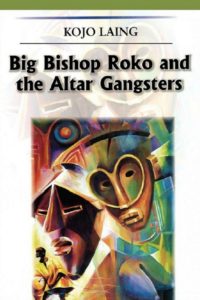
5. Big Bishop Roko and the Altar Gangsters (2006)
Published by Woeli Publishing Services, Laing’s witty last novel is rendered in dark humor and anchored by religious figures interested as much in genetic engineering as they are in class divisions. Here, the Anglican Bishop Roko applies both science and doctrine in his work on different types of sharks and their sperm, hoping to unleash a mutation of the human race in order to “free all the truths locked up in the different cultures, to free all the divinity locked up in different religions, and to free and learn from the most complex ethical beings of the universe.” Meanwhile, the Pope, who is devoted to ecumenism and “loves boxing over the telephone,” and the Archbishop of Canterbury are unable to stop him from achieving this. Like in his last novel before this, war is inevitable.
This is 366 pages of non-conventional narration. “The story,” writes Fredu Agyeman, “is not told by an omniscient narrator nor by a first person who plays a major part of the story but by a narrator who ‘threads’ on the periphery of events and plays a moderate role in the events.” The novel has even been read as an allegory for “the changing landscape of global digital access.”




